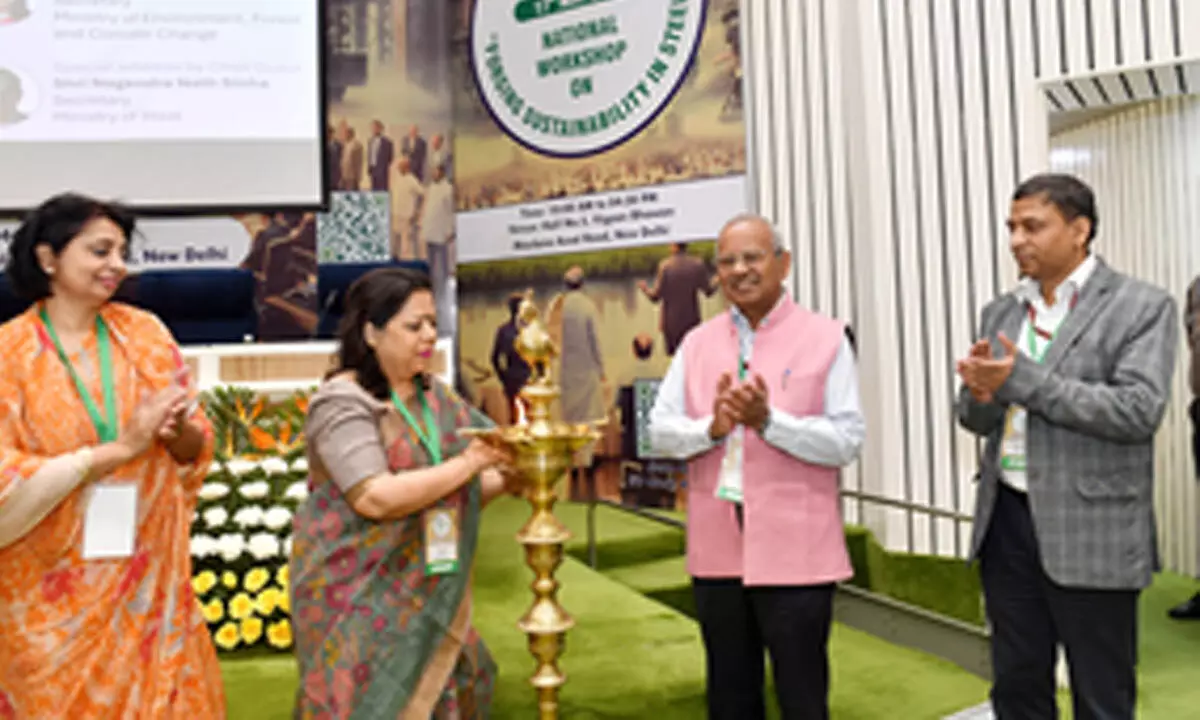Live
- They always want me to win, and now I feel lucky to have been offered a story like ‘Zebra’: Satyadev Kancharana
- ‘Democracy first, humanity first’: PM Modi in Guyana's parliament on two countries' similarities
- PKL Season 11: Telugu Titans register third straight win to top standings
- Is Pollution Contributing to Your COPD?
- NASA Unveils Underwater Robots for Exploring Jupiter's Moons
- Additional Central forces arrive in violence-hit Manipur
- AR Rahman and Saira Banu’s Divorce: Legal Insights into Common Issues in Bollywood Marriages
- 82.7 pc work completed in HPCL Rajasthan Refinery area: official
- Curfew relaxation extended in 5 Manipur districts on Friday
- Tab scam prompts Bengal govt to adopt caution over fund disbursement
Just In
Govt eyes hydrogen-based process for steel production to cut carbon emissions

Secretary, Ministry of Steel, Nagendra Nath Sinha said on Friday that the government is working on introducing a green hydrogen-based process in the steel industry where the iron will be directly reduced with 100 per cent hydrogen, resulting in a sharp reduction in carbon emissions.
New Delhi: Secretary, Ministry of Steel, Nagendra Nath Sinha said on Friday that the government is working on introducing a green hydrogen-based process in the steel industry where the iron will be directly reduced with 100 per cent hydrogen, resulting in a sharp reduction in carbon emissions.
“This technology for Direct Reduced Iron (DRI) making, although currently expensive, holds promise for a sustainable future if developed and adopted collectively,” Sinha said at a workshop on "Forging Sustainability in the Steel Sector.”
Addressing the challenge of rising carbon emissions amid growing demand, Sinha pointed out that India's per ton crude steel emission is 25 per cent higher than the global average and is attributed, inter alia, to factors such as lack of natural gas, the quality of available iron ore, which requires beneficiation for use in Direct Reduced Iron (DRI) processes and the limited availability of scrap, with domestic scrap generation standing at only 20-25 million tonnes.
To address these challenges, Sinha mentioned the ongoing efforts of a task force comprising the Ministry of Mines and the Ministry of Environment, Forest and Climate Change which is focused on encouraging the beneficiation of low-grade iron ore to improve its suitability for steelmaking.
He also discussed historical factors affecting scrap availability and noted that the policies like Extended Producer Responsibility (EPR) for the auto sector proposed by the Ministry of Environment, Forest and Climate Change, aimed at increasing vehicle scrap availability, through the industrial and construction sectors will continue to have higher steel consumption.
He also pointed out that 90 per cent of emissions in steelmaking come from within the factory gates, with the remaining emissions from electricity generation and upstream processes.
Therefore, the industry has substantial control over its emissions and must take proactive steps towards sustainability.
“While the ministry will continue to provide guidance and nudge, it is imperative that the steel industry itself takes up the mantle as trustees of the Earth to work towards reducing emissions and promoting sustainability,” Sinha said.
He said that 14 task forces have been formed by the Ministry of Steel to tackle various aspects of sustainability in the steel industry such as enhancing energy efficiency through the adoption of the best available technology, utilising renewable energy sources, and preparing inputs to reduce emissions.
The ministry is also exploring the use of green hydrogen and carbon capture, utilisation, and storage technologies.
Water consumption in steelmaking was identified as another critical area for improvement. Sinha noted that India's water consumption levels are higher compared to other countries, with efforts underway to reduce this.
He also lauded the Securities and Exchange Board of India's (SEBI) introduction of the Business Responsibility and Sustainability Reporting Format and urged companies to take it seriously.
Leena Nandan, Secretary Ministry of Environment, Forest and Climate Change stated that India’s updated Nationally Determined Contributions (NDCs) for 2030 reflect the ambition whereby 50 per cent of energy will be sourced from non-fossil fuels.
“We aim to reduce the emission intensity of our economy by 45 per cent,” she said.
She called for transforming ideas into actionable collaborations, stressing that the steel industry's sustainability efforts must stem from a deep-seated sense of responsibility.

© 2024 Hyderabad Media House Limited/The Hans India. All rights reserved. Powered by hocalwire.com






